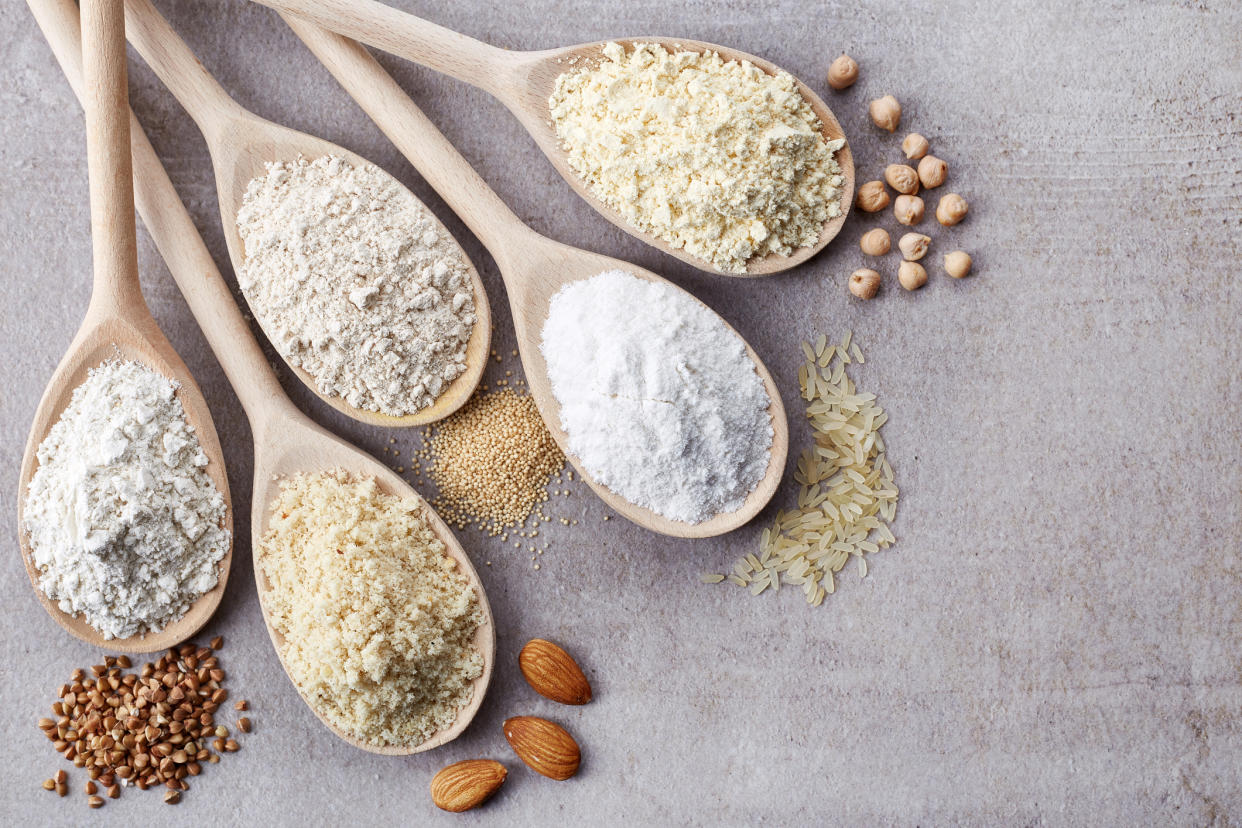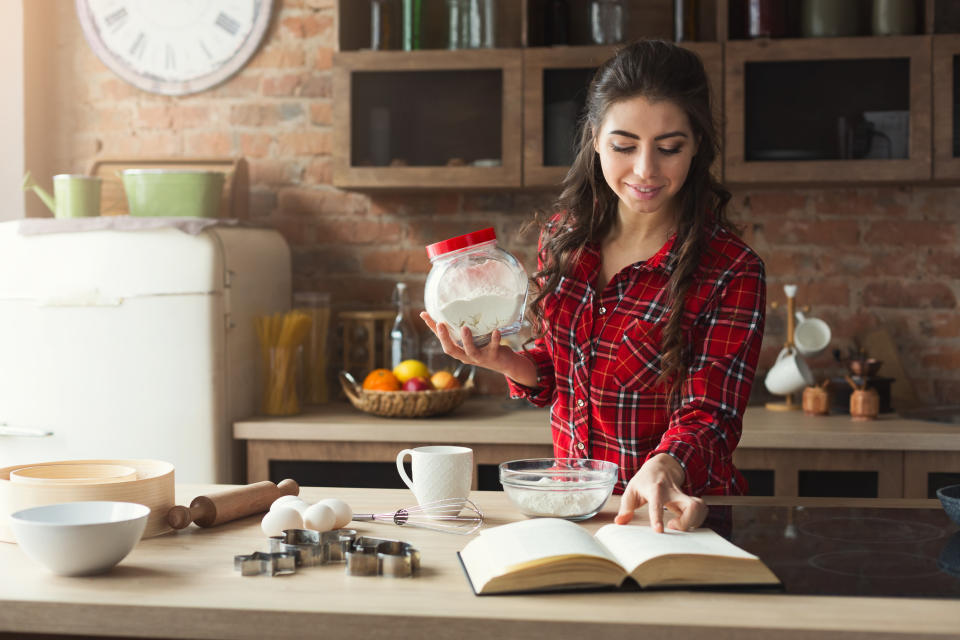Flour sold out almost everywhere: What to substitute for your coronavirus lockdown baking

Yahoo Lifestyle is committed to finding you the best products at the best prices. We may receive a share from purchases made via links on this page. Pricing and availability are subject to change.
While toilet rolls have started to make a reappearance back on the supermarket shelves, one ingredient that remains near impossible to get hold of during coronavirus pandemic is flour.
But with many of us turning to baking to fill the long lockdown days, not being able to buy flour is putting a spanner in the banana bread baking works.
According to consumer analysts Kantar sales of flour were up 92% in the four weeks to 22 March, compared to the same period last year.
And while the National Association of British and Irish Millers (NABIM) says the industry is “working round the clock”, to try to double production, it is still struggling to meet demand.
Read more: Restaurants share free tutorials to try at home
But before you hang up your apron and step away from the mixing bowl, it’s worth noting that there are some pretty decent alternatives to traditional flour that can be used as a substitute when channelling your inner Mary Berry.
Some you may have languishing in your kitchen cupboards, but others should be much easier to get hold of than the continuously sold-out self-raising.
Brown rice flour
According to Jane Clarke from Nourish by Jane Clarke, brown rice flour is perhaps the most versatile of flour alternatives, as its very similar to traditional flour and is mild in flavour, so can easily be made into breads, pastries, cakes etc
Almond flour
This can be bought or made yourself by grinding almonds. “It tends to not be as fine a texture as normal flour so I use in more substantial bakes like fruit cakes, bakewell slices, brownies, or as a breadcrumb equivalent to pieces of fish or chicken to make delicious fish fingers,” Clarke adds.
Chickpea flour
This has a delicious nutty taste, so Clarke suggests using it in more savoury products such as breads, dumplings and scones.

Read more: Quick and easy at-home lunch ideas (that aren't sandwiches)
Corn flour or arrowroot flour
This isn’t necessarily going to help if you want to bake a Victoria sponge, but according to Sarah Almond Bushell, dietician and nutritionist on the Zoono family panel, corn flour or arrowroot flour can be used when making sauces such as white sauces, cheese sauces and gravy as they are great thickeners.
Buckwheat flour
According to nutritionist Jenna Hope buckwheat flour is great for binding and produces an elastic type consistency in mixes. “Buckwheat is also a great source of B-Vitamins and fibre,” she adds.
Quinoa flour
Easily made by grinding uncooked quinoa, Clarke suggests using in muffins, pancakes, breads as its relatively easy to use.
“Quinoa is considered a complete protein and is a great option for those following a plant based diet to increase protein consumption,” Hope adds.
Coconut flour
“Perhaps the most tricky to use as it tends to absorb a lot of moisture,” warns Clarke. “I tend to mix it with some of the others above. It is sweet tasting but has a lower GI value than normal flour. I use for pakora style fish dishes and making pancakes.”
According to Almond Bushell, coconut flour is high in saturated fat so not great for heart health. “But it also contains a healthy MCT [medium-chain triglyceride] fat which may help lower cholesterol,” she adds.
Read more: The foods you can and can't freeze
Chickpea flour
Chickpea flour is high in protein and fibre and low in calories. “It makes for a delicious alternative in recipes such as breads, crackers and savoury dishes,” Hope explains.
Oat flour
Oat flour is a good, cheap gluten free flour. “Oat flour can be made by grinding down oats which can make it even cheaper,” Hope explains.
“It works well in cakes, cookies and other bakes. Oats contain beta-glucans which are associated with reduced cholesterol.”
Soya flour
“Soya flour is particularly high in protein and so is great for using in high protein, lower carbohydrate dishes. Soya is a source of calcium and iron,” Hope says.
Read more: Certain foods can be eaten months after their best-before date, Which? finds

Rice flour combined with ground almonds
This, combined in a ratio of four parts rice to three parts almonds, makes a great alternative cake flour, according to Almond Bushell.
Rice flour and potato flour
Similarly, rice and potato flour combined together is a good alternative for pastry as its very absorbent and so holds the liquid better, making it less crumbly, Almond Bushell adds.
Amaranth flour
While this can be used as an alternative to flour, Almond Bushell warns it has quite a strong flavour so best combined with other types of flour rather than used on its own. On the upside, it does contain lots of nutrients, fibre, protein, iron and minerals.
Where to buy flour alternatives online
Amazon
Our Top Pick: Sevenhills Wholefoods Organic Coconut Flour 500g | £3.99

The global retailer can currently tick off pretty much all flour mentioned above. Plus, if you sign up to Prime, you can get your delivery the next day.
British Corner Shop
Our Top Pick: Doves Farm Organic Corn Flour | £2.69

The British store has a huge range of flower, from organic white rye flour to gluten free and, if you’re lucky, you may even manage to snag some self-raising.
Vitalife Health
Our Top Pick: Superfruit Organic Almond Flour | £15.52

The health food store has all your alternative flour needs covered. However, due to the current demand you may have to wait up to three weeks to receive your order.



